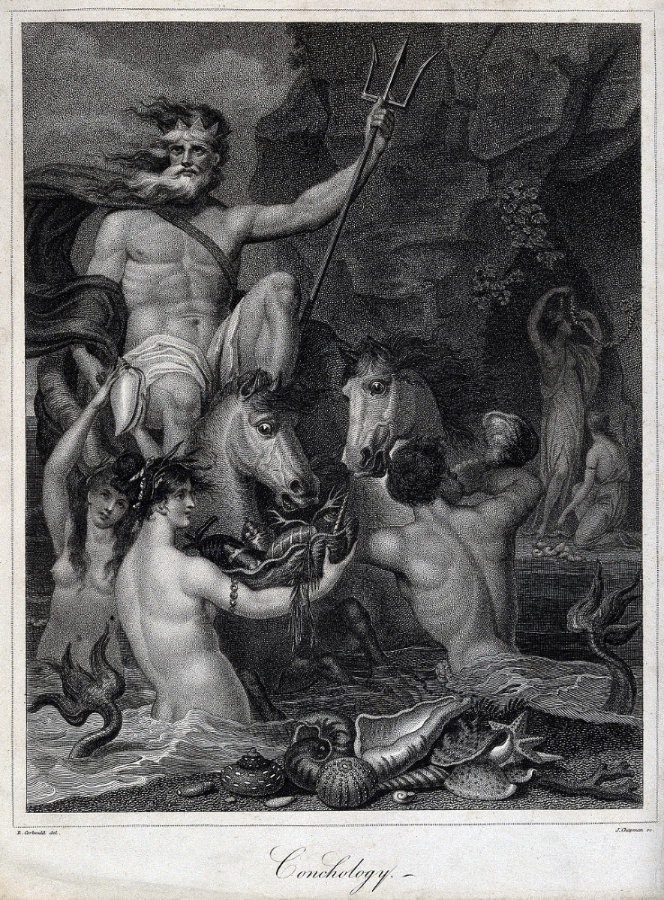Neptune is the god of freshwater and the sea in Roman religion. He is the counterpart of the Greek god Poseidon. In the Greek tradition, he is a brother of Jupiter and Pluto; the brothers preside over the realms of heaven, the earthly world (including the underworld), and the seas. Salacia is his wife. Depictions of Neptune in Roman mosaics, especially those in North Africa, were influenced by Hellenistic conventions. He was likely associated with freshwater springs before the sea. Like Poseidon, he was also worshipped by the Romans as a god of horses, as Neptunus equestris (a patron of horse-racing). The theology of Neptune is limited by his close identification with the Greek god Poseidon, one of many members of the Greek pantheon whose theology was later tied to a Roman deity. The lectisternium of 399 BC indicated that the Greek figures of Poseidon, Artemis, and Heracles had been introduced and worshipped in Rome as Neptune, Diana, and Hercules. It has been speculated that Neptune has been conflated with a Proto-Indo-European freshwater deity; since the Indo-Europeans lived inland and had little direct knowledge of the sea, the Romans may have reused the theology of a previous freshwater god in their worship of Neptune. Servius explicitly names Neptune as the god of rivers, springs, and waters; he may parallel the Irish god Nechtan, master of rivers and wells. This is in contrast to Poseidon, who was primarily a god of the sea. Neptune has been associated with a number of other Roman deities. By the first century BC, he had supplanted Portunus as the god of naval victories; Sextus Pompeius called himself the “son of Neptune”. For a time, Neptune was paired in his dominion of the sea with Salacia, the goddess of saltwater. Neptune was considered the legendary progenitor god of the Falisci (who called themselves Neptunia proles), joining Mars, Janus, Saturn, and Jupiter as the deific father of a Latin tribe.
| Alias Neptune, Poseidon |
| Real Names/Alt Names Neptune |
| Characteristics Myths & Legends, Deity, Immortal, Prehuman Epoch, Greek, Italian |
| Creators/Key Contributors Unknown |
| First Appearance Greek mythology |
| First Publisher ○ |
| Appearance List Literature: Homer’s Odyssey (c. 8th century BCE, English 1614), Homer’s Iliad (c. 8th century BC), Virgil’s Aeneid (29 to 19 BC), Metamorphoses (poem) by Ovid (8 CE), plays by Aeschylus, Sophocles, Euripides, Plato, Shakespeare, Dante Alighieri’s Divine Comedy (1308–1320), etc. Comics: Captain Marvel Comics vol. 4 #11, Humdinger vol. 1 #4, Mystery Men Comics #24, Hit Comics #2, Pep Comics #20, Blue Circle Comics #1-5, America’s Greatest Comics #5, Nature Boy #3-5, Feature Comics #70, 92, Hoppy the Marvel Bunny #9, Weird Comics #2, 10, Master Comics #41, A Treasury of Horses. |
| Sample Read Bulfinch’s Mythology by Thomas Bulfinch [Internet Archive] |
| Description Neptune is the god of freshwater and the sea in Roman religion. He is the counterpart of the Greek god Poseidon. In the Greek tradition, he is a brother of Jupiter and Pluto; the brothers preside over the realms of heaven, the earthly world (including the underworld), and the seas. Salacia is his wife. Depictions of Neptune in Roman mosaics, especially those in North Africa, were influenced by Hellenistic conventions. He was likely associated with freshwater springs before the sea. Like Poseidon, he was also worshipped by the Romans as a god of horses, as Neptunus equestris (a patron of horse-racing). The theology of Neptune is limited by his close identification with the Greek god Poseidon, one of many members of the Greek pantheon whose theology was later tied to a Roman deity. The lectisternium of 399 BC indicated that the Greek figures of Poseidon, Artemis, and Heracles had been introduced and worshipped in Rome as Neptune, Diana, and Hercules. It has been speculated that Neptune has been conflated with a Proto-Indo-European freshwater deity; since the Indo-Europeans lived inland and had little direct knowledge of the sea, the Romans may have reused the theology of a previous freshwater god in their worship of Neptune. Servius explicitly names Neptune as the god of rivers, springs, and waters; he may parallel the Irish god Nechtan, master of rivers and wells. This is in contrast to Poseidon, who was primarily a god of the sea. Neptune has been associated with a number of other Roman deities. By the first century BC, he had supplanted Portunus as the god of naval victories; Sextus Pompeius called himself the “son of Neptune”. For a time, Neptune was paired in his dominion of the sea with Salacia, the goddess of saltwater. Neptune was considered the legendary progenitor god of the Falisci (who called themselves Neptunia proles), joining Mars, Janus, Saturn, and Jupiter as the deific father of a Latin tribe. |
| Source Neptune (mythology) – Wikipedia |





